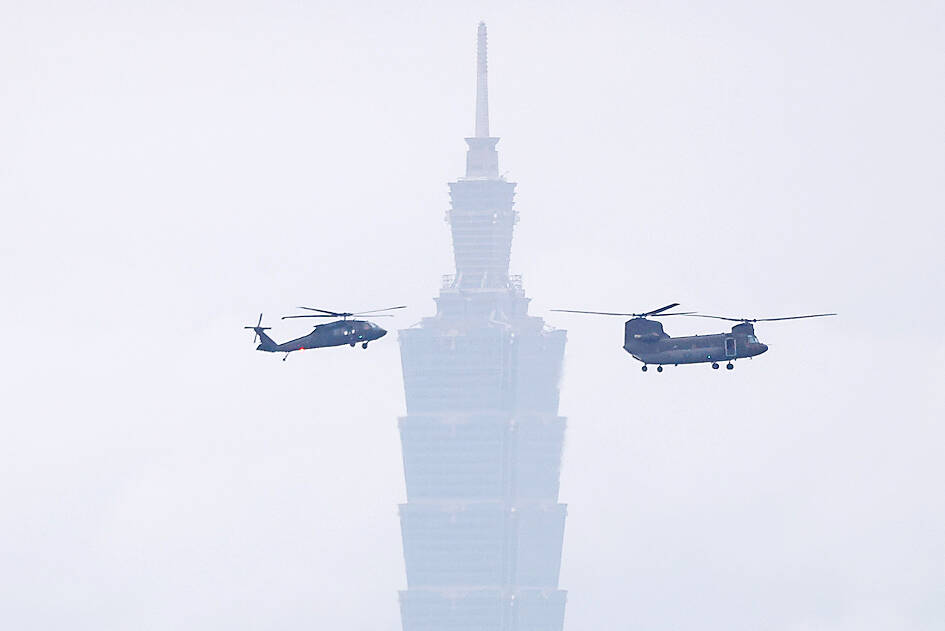Cyberattacks from China have surged to 2.5 million per day as it intensifies its “gray zone” activities ahead of president-elect William Lai’s (賴清德) inauguration on Monday next week, the National Security Bureau (NSB) said yesterday at a meeting of the legislatures’ Foreign Affairs and National Defense Committee.
An official in charge of the agency’s fifth division made the comments in response to questions from Democratic Progressive Party (DPP) Legislator Wang Ting-yu (王定宇) about possible Chinese activities that would coincide with the inauguration.
China has increased disinformation operations and cyberattacks, the official said, adding that the latter more than doubled the average of 1 million hacks per day earlier this year.

Photo: Ann Wang, Reuters
The attacks, which mainly targeted government agencies, are being countered by the bureau’s efforts to find and eliminate cybersecurity vulnerabilities before they could be exploited, they said.
The bureau detected an uptick in Chinese “gray zone” warfare, but nothing unusual from the Chinese People’s Liberation Army (PLA) in the months leading to the inauguration, NSB Deputy Director-General Ko Cheng-heng (柯承亨) said.
Asked by DPP Legislator Michelle Lin (林楚茵) whether Wednesday’s sanctions against Taiwanese pundits by China threatened to “Hong Kongize” Taiwan, Ko said that Beijing’s campaign against the nation would spark a stronger backlash from the world’s democracies.
Vice Minister of Foreign Affairs Remus Chen (陳立國) said that China’s experiment with extraterritorial repression has angered democratic nations globally, which cannot tolerate infringement on their national sovereignty and their citizens’ rights.
Meanwhile, a US Department of State spokesperson on Wednesday urged China to stop military, diplomatic and economic pressure against Taiwan, calling for Beijing to conduct meaningful dialogue across the Taiwan Strait.
The spokesperson made the remark in response to a request for comment from Central News Agency (CNA).
On Tuesday and Wednesday, the Ministry of National Defense detected 51 PLA vessels operating near Taiwan.
The US expresses its concern over China’s continued attempt at intimidating and pressuring Taiwan, as Beijing’s actions carry a risk of miscalculation harming regional peace, the US spokesperson said.
Washington is to continue its opposition to any unilateral change of the “status quo” and support the peaceful resolution of the question concerning both sides of the Strait, positions that agree with the interests of Taiwanese, they said.
The US would ensure that diplomatic and military communication channels with Beijing remain open during the sensitive period of Taiwan’s transfer of power, a US official separately told CNA.
Likewise, Washington will maintain unofficial ties with Taiwan, they said.
The American Institute in Taiwan has advised Lai’s incoming administration of Washington’s long-standing policy on affairs in the Strait, they added.
The US cautions Taiwan that China would likely carry out coercive actions via “gray zone” tactics, they said, citing the example of China Coast Guard pressure near Kinmen County in February.
These tactics are not new for Beijing, which has practiced them in the South China Sea and around the Diaoyutai Islands (釣魚台), they said.

CHAOS: Iranians took to the streets playing celebratory music after reports of Khamenei’s death on Saturday, while mourners also gathered in Tehran yesterday Iranian Supreme Leader Ayatollah Ali Khamenei was killed in a major attack on Iran launched by Israel and the US, throwing the future of the Islamic republic into doubt and raising the risk of regional instability. Iranian state television and the state-run IRNA news agency announced the 86-year-old’s death early yesterday. US President Donald Trump said it gave Iranians their “greatest chance” to “take back” their country. The announcements came after a joint US and Israeli aerial bombardment that targeted Iranian military and governmental sites. Trump said the “heavy and pinpoint bombing” would continue through the week or as long

TRUST: The KMT said it respected the US’ timing and considerations, and hoped it would continue to honor its commitments to helping Taiwan bolster its defenses and deterrence US President Donald Trump is delaying a multibillion-dollar arms sale to Taiwan to ensure his visit to Beijing is successful, a New York Times report said. The weapons sales package has stalled in the US Department of State, the report said, citing US officials it did not identify. The White House has told agencies not to push forward ahead of Trump’s meeting with Chinese President Xi Jinping (習近平), it said. The two last month held a phone call to discuss trade and geopolitical flashpoints ahead of the summit. Xi raised the Taiwan issue and urged the US to handle arms sales to

State-run CPC Corp, Taiwan (CPC, 台灣中油) yesterday said that it had confirmed on Saturday night with its liquefied natural gas (LNG) and crude oil suppliers that shipments are proceeding as scheduled and that domestic supplies remain unaffected. The CPC yesterday announced the gasoline and diesel prices will rise by NT$0.2 and NT$0.4 per liter, respectively, starting Monday, citing Middle East tensions and blizzards in the eastern United States. CPC also iterated it has been reducing the proportion of crude oil imports from the Middle East and diversifying its supply sources in the past few years in response to geopolitical risks, expanding

Pro-democracy media tycoon Jimmy Lai’s (黎智英) fraud conviction and prison sentence were yesterday overturned by a Hong Kong court, in a surprise legal decision that comes soon after Lai was jailed for 20 years on a separate national security charge. Judges Jeremy Poon (潘兆初), Anthea Pang (彭寶琴) and Derek Pang (彭偉昌) said in the judgement that they allowed the appeal from Lai, and another defendant in the case, to proceed, as a lower court judge had “erred.” “The Court of Appeal gave them leave to appeal against their conviction, allowed their appeals, quashed the convictions and set aside the sentences,” the judges